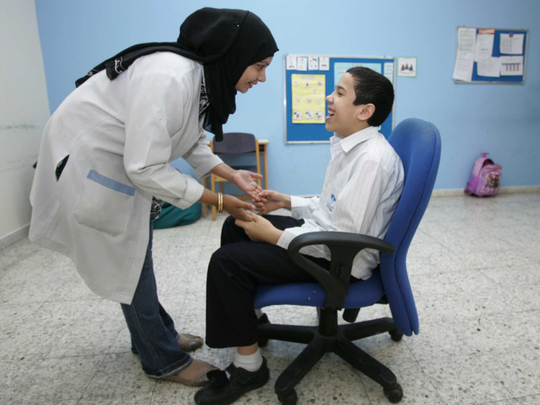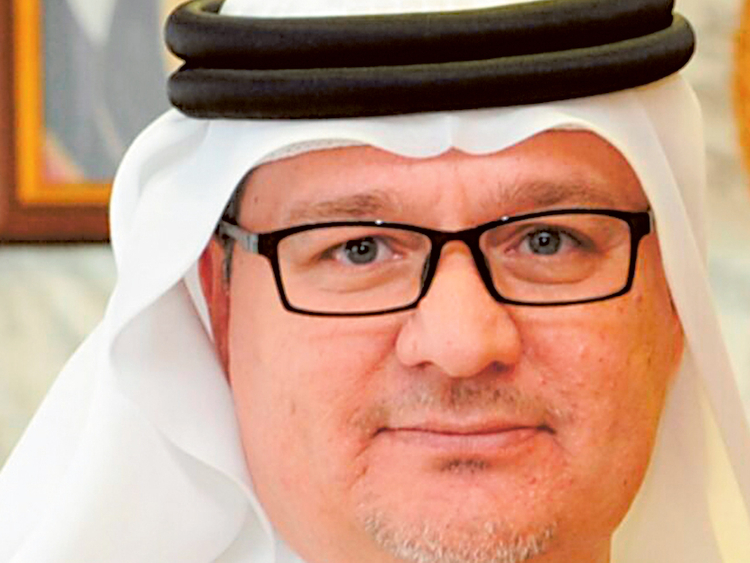
Dubai: The recent donation made by Shaikh Hamdan Bin Mohammad Bin Rashid Al Maktoum, Crown Prince of Dubai and Chairman of Dubai Autism Centre, of the entire prize money of $6 million (Dh27 million) won by King Bishop at the world’s richest race on March 29, to the DAC is a generous gesture to commemorate World Autism Day that falls today (April 2). The amount will go towards the completion of the new Autism Centre in Al Garhoud early next year.
The centre is celebrating the day by renewing its vow to get children diagnosed with Autism Spectrum Disorder (ASD) to be integrated into society. It has launched a campaign, ‘Accept me the way I am, I am a child of autism’. This message is being relayed across schools, communities and to families.
“Don’t wait for a child to be cured of autism but recognise the symptoms, help him manage those and accept him the way he is. During this period we aim to educate school authorities, hold workshops and seminars for parents and help ease the stress on families that have autistic children,” Mohammad Al Emmadi, Board Member and Director-General of the Dubai Autism Centre, told Gulf News.
Cost of caring
The centre, which was established in 2001, has 57 students on its rolls and 285 on the waiting list. It is moving to a new facility in Al Garhoud early next year where it will be able to accommodate 135-204 students. Al Emmadi elaborated on the challenges ahead: “The teacher-pupil ratio in our classroom is two special education teachers for every three students. Even if we try and accommodate six students with three special needs teachers we cannot accommodate more than 204 students.”
Right now every child pays an annual fee of Dh40,000 while the centre incurs an additional expense of Dh100,000 per student. “That is because of the special requirements for therapy for each child which comes at a high cost. We have special education teachers, speech therapists, occupational therapists, language therapists, music therapists, computer therapists and teachers for outside activities, apart from the usual expenses we incur on the salaries of the administrative staff.”
The centre is in frequent need of fundraisers. Recently, it collaborated with leading public agencies to raise Dh27 million for the centre and the amount donated by Shaikh Hamdan will be a great help.
Extend a helping hand
“We always encourage donations from generous individuals and right now we would like to request donations in kind for the new premises such as benches, light fittings, fans, etc. Every dirham saved on the cost of construction will help us channel the funds towards more meaningful costs of employing more special needs teachers and therapists.”
Al Emmadi feels instead of extending funds for one student, any help towards funding the salary of one teacher is far better. “While help to one student will limit the funds to that individual only, that money is precious as one teacher can help four-six students,” he explained
Autism has been rising steadily worldwide and it is estimated that one child in every 68 born worldwide is likely to have autism. “Over a period of time, raising awareness and educating parents, doctors and school authorities have helped people detect children with autism earlier and, as a result, more and more children are turning up at DAC and other centres for therapy. There was denial earlier and now, with awareness, there is acceptance on the part of the parents who are willing to come for assessment of their child and look at ways to help their child,” says Al Emmadi.
Future challenges
But a lot more needs to be done to socially integrate these children into the community. “Early intervention is important and a child with autism needs to be put into therapy to prevent deterioration of his condition,” says Al Emmadi, who feels not many schools are keen on inclusion or integration. The greater challenge today is managing autistic adults. “Once an autisitic child turns 18, he is out of our school and there is nothing to help him further. There is no employment for these kids, no social clubs and nowhere to go. As a result these young adults feel isolated and slide back on their development. It would be heartening to see any agency take up this initiative,” he added.













